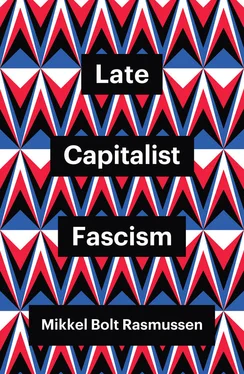Let’s be clear: there is not a radical break between fascism and democratic states. We know that not only is the state founded on its exception from the law, it actively employs extra-legal measures whenever there’s a crisis. 17In a situation of crisis the state goes outside the law it has itself created and upholds; it imposes a state of exception in order to re-create order. The War on Terror was an example of such a crisis situation: the sovereign, George W. Bush, introduced a series of ‘anti-terror’ decrees that curtailed public and private freedoms, procedure took precedence over law and exception became the rule. The Patriot Act and the Military Order made it possible for the US army to detain people who were suspected of terrorist activity for an unspecified period of time, completely revoking these persons’ legal status.
Trump inherited a gigantic imperial war machine, a carceral infrastructure of enormous proportions and a racist police force armed with military equipment. He heightened the repressive and exclusionary politics that are integral to the US empire abroad and at home. But he did not in any way misuse his executive powers. He was just using them in the way they were actually supposed to be used. Trump trespassing on democracy and the constitutional state is just Trump doing what he is supposed to do as sovereign and US president. It was telling that, when Trump in 2020, against the expressed wish of local governors, decided to employ his own storm troopers, it was a combination of neo-Nazi militias and the Border Patrol, which he had flown in. And the Border Patrol was merely doing what it has in fact been doing for more than a century at the border and what the US army has been doing all over the world since the Tagalog Insurgency in the Philippines in the early twentieth century. 18
A Biden presidency will not be a departure from this. Obama increased the number of deportations and launched ten times more drone strikes than Bush. It will be a relief to be rid of Trump and his rambling tweets that explicitly gestured to fascist militias. But Biden will no doubt do his part to expand the mass incarceration and imperialism that is the core of the US state. One or two stimulus packages will not change that.
This book is not only about the extreme right and fascism but also about a crisis-ridden capitalist society that tends towards adopting more and more authoritarian solutions that will inevitably bring more chaos. The decomposition of the national democratic political system has opened the door to the new fascism, which is not only visible in outrageously fear-mongering xenophobic political leaders like Trump, Bolsonaro, Orbán, Salvini and Le Pen. It is also becoming a permanent marker of the ‘extreme centre’ that is trying to keep up with the fascist parties and their ability to address the economic crisis directly, although displacing the cause by scapegoating migrants, Muslims, communists, Jews – in short, the dangerous other. Because fascism today is not isolated in specific fascist parties but is spread out in everyday culture and has become an almost obligatory part of the functioning of the nation state, any attempt to oppose this formation has to combine anti-fascism with anti-capitalism and a critique of the nation state. Critiquing fascism means attacking the authoritarian and racist turn of late capitalism with a possible view to superseding the money economy and the state form. Anti-fascism has to be radical in the sense of going to the roots of the problem: true anti-fascism implies a radical critique of the present order of things.
For a brief period in the second half of the twentieth century the ruling class in the West was able to persuade a large part of the local working class to let go of any revolutionary pretensions, all the while intervening in former colonies, brutally destroying the decolonial movement. Sweet talking the local working class through jobs, culture and commodities and killing revolutionaries in the former colonies went hand in hand. It is this geography of welfare in ‘the North’ and violence in ‘the South’ that is being remade. The two worlds were obviously intimately connected all the way through. But, for a brief period, it seemed as if the violence of the capitalist state was waning or was being replaced by something different, something more subtle. Deleuze’s control society was an analysis of this shift where power was internalized and the institutions of disciplinary society dissolved. 19Deleuze of course knew this was not the case: the brutal crackdown on the 77 movement in Italy and the fate of the black revolutionaries in the US had shown that the ‘anarchic’ violence of the state had not gone away. It is important not to isolate the post-Second World War era in the North but to see how it has been part of a brutal fascist geography of violence and counter-insurgency. When the economic foundations of the Fordist class compromise disappeared, fascism returned to the North. For a period in the second part of the twentieth century the fascist zone was reserved for the most rebellious subjects, and most people could dissent and protest as they saw fit. This is no longer the case. The repressive side of the capitalist state has returned.
Deleuze was hugely inspired by George Jackson, who was very clear about the connection between a local US fascism that locked up or simply shot blacks and the imperialist US military abroad in places such as Vietnam. They were two aspects of the same state that allowed protests and a certain level of freedom to white people in the US but killed militant African Americans and rebellious Vietnamese. There’s no way to separate the two; it was the same capitalist state which gave local (white) workers jobs and killed the revolutionaries in the ghettos and in the jungle.
This book has two parts. Chapter 1outlines the various crises that have laid the groundwork for the growth of fascism. It attempts to historicize and contextualize the re-emergence of fascism as an outcome of a longer political economic development characterized by a shrinking economy and a hollowing out of the political system. The financial crisis dealt a heavy blow to an already credit-inflated economy, and the subsequent political mishandling accelerated what was by then a quite advanced delegitimation of politics as we know it. The political hegemony of neoliberal global capitalism is in tatters and the bourgeoisie has a hard time agreeing on a new course. Because racism and ultra-nationalism have proved themselves to be the only means with which it is possible to uphold electoral politics, fascist parties are gaining ground everywhere. Together this constitutes what the historian of fascism Geoff Eley calls a ‘fascism-producing crisis’. 20
Chapter 2is an analysis of late capitalist fascism. I argue that fascism is not merely a question of political parties and fascist leaders but also something broader – a lived reality and an unfolding process. My analysis therefore takes the contradictory realm of everyday life into account in trying to dissect the ‘intensely superstructural’ character of late capitalist fascism. 21Late capitalist fascism is a violent yearning for the return of everything and everyone to their proper, ‘natural’ place, the denunciation and removal of migrants, Muslims and communists who threaten the ‘natural order’. There exists an ‘original’ community. And that community is in danger and needs protecting. The leader has to step up and impose order. This is still the fascist myth. But today this myth circulates through online communities in an infantilized public sphere where politics and entertainment are indistinguishable. In the society of the spectacle, incoherent fantasies of decline and dangerous conspiracies flourish, uniting political leaders and high-school killers and a scared networked population.
Читать дальше












